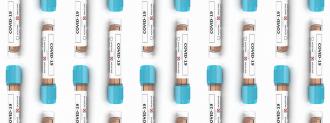California-based diagnostics company BillionToOne has announced the creation of a coronavirus test, which it says would allow the United States to check more than a million people for COVID-19 every day.
Currently, the U.S. is testing just a fraction of that (between 100,000-150,000) each day.
Throughout the pandemic, most places have been using quantitative polymerase chain reaction (qPCR) testing to determine whether a patient is infected with the novel coronavirus SARS-CoV-2.
To do this, they first take a specimen sample from the back of the patient’s throat. Then they use chemicals to extract any viral RNA from the specimen and an enzyme to convert that RNA into DNA.
The U.S could double its total number of people tested in just two days.
A specialized machine then heats and cools the DNA in a way that replicates it, making the coronavirus detectable.
PCR testing is reliable and doesn’t take too long — about four hours from the time a sample reaches the lab.
However, the process requires some skill and the chemicals and instruments needed for a PCR-based coronavirus test are currently in short supply in the U.S.
“I would say that the reason why testing isn’t widespread is not because the labs didn’t want to do it. It’s just very hard to do, and the supplies are really limiting right now,” pathologist Geoffrey S. Baird told Quartz.
“Many hospitals that would like to be doing this testing simply cannot buy an instrument or get the supplies to do it,” he added.
Due in part to those limitations, the U.S. only tested about 2 million people between January 18 and April 8 — a mere .6% of the population.
BillionToOne’s coronavirus test could allow the U.S to double its total number of people tested in just two days, according to the company’s announcement.
That’s because the test eliminates the need for RNA-extraction chemicals and requires minimal training.
It also relies on an instrument called a Sanger Sequencer, which can run 1,536 samples at once, instead of a common qPCR instrument, which usually can only run 48 at a time.
Each Sanger sequencing instrument could complete 3,840 tests per day. The Human Genome Project alone has hundreds of these instruments, enough to allow the U.S. to run more than a million coronavirus tests every day.
BillionToOne says it expects to submit its coronavirus test to the U.S. Food and Drug Administration in about two weeks in the hopes of receiving Emergency Use Authorization.
Once authorized, the company will begin selling its coronavirus test kits to labs with Sanger sequencing instruments for about $15, BillionToOne CEO Oguzhan Atay told Genome Web.
That price will include the use of BillionToOne’s analysis software. Add in the cost of Sanger sequencing — $2 and $6 per sample — and the whole cost of testing a person for the coronavirus using BillionToOne’s method is about $20.
Currently, Medicare pays labs $36 to run one of the CDC’s tests, meaning that BillionToOne’s coronavirus test could be the cost-effective, efficient alternative to qPCR testing the U.S. so desperately needs.






